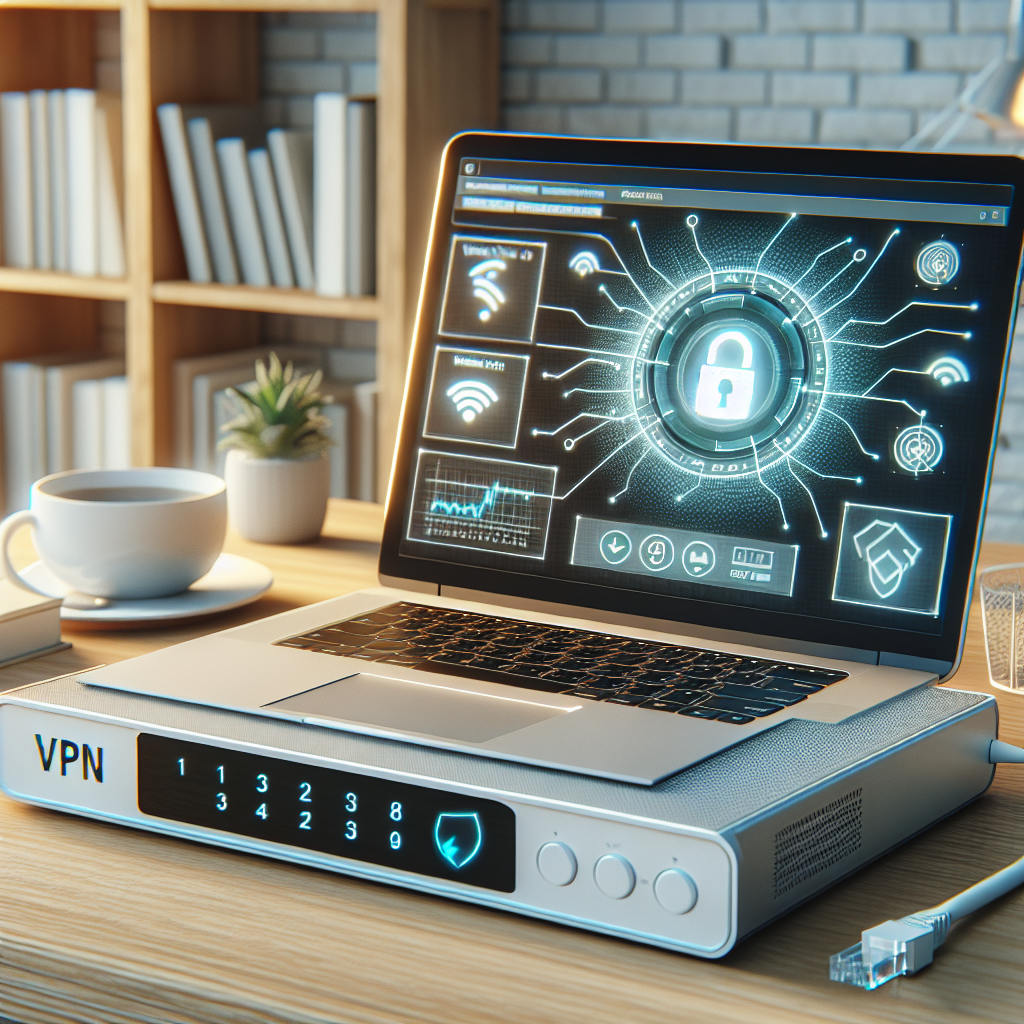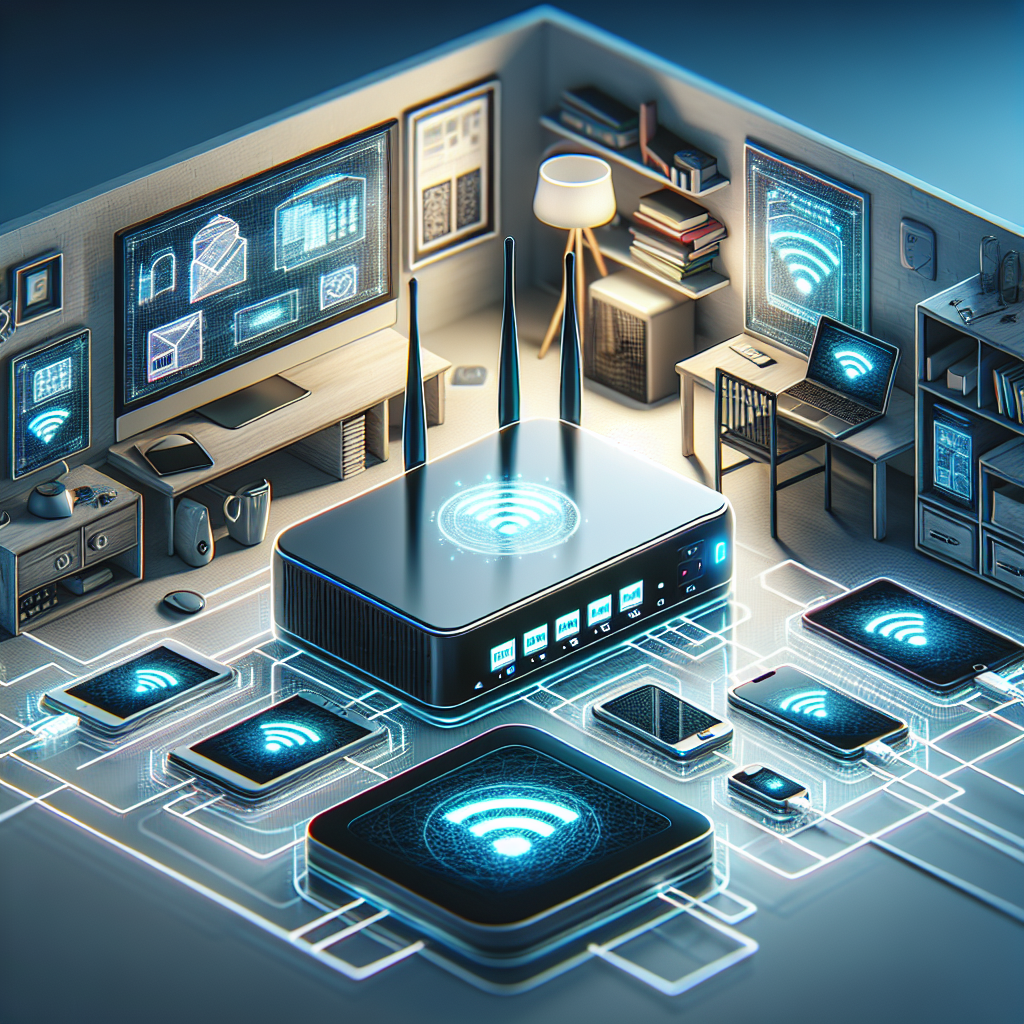In today’s digital age, securing our online privacy has become more important than ever. One of the ways to do so is by using a VPN (Virtual Private Network) router for home networking. A VPN router allows you to encrypt your internet connection and protect your data from prying eyes, whether you’re browsing the web, streaming content, or working remotely. By setting up a VPN router in your home network, you can ensure that your online activities are kept private and secure. Join us as we explore the world of home networking with a VPN router and take control of your digital security.
Understanding VPN Routers
In the realm of home networking, a VPN router serves as a powerful tool that enhances security, privacy, and accessibility for connected devices. Let’s delve into the intricacies of what a VPN router entails and how it functions seamlessly within the network environment.
- What is a VPN router?
-
A VPN router is a networking device that integrates VPN (Virtual Private Network) capabilities directly into its hardware. This feature allows all data transmitted between the connected devices and the internet to be encrypted and securely tunneled through a remote server. By doing so, the VPN router extends the protective shield of a VPN to all devices within the network.
-
How does a VPN router work?
-
When a device connects to the internet through a VPN router, the router encrypts the data packets before transmitting them. These encrypted data packets are then sent through a secure tunnel to a VPN server, where they are decrypted and forwarded to the intended destination. This process effectively masks the user’s IP address and encrypts their online activities, shielding them from potential cyber threats and surveillance.
-
Benefits of using a VPN router for home networking
- Enhanced Security: A VPN router adds an extra layer of security to the entire network by encrypting all data traffic, protecting sensitive information from hackers and cybercriminals.
- Privacy Protection: With a VPN router, users can enjoy enhanced privacy online as their internet activities are anonymized through the VPN server, preventing ISPs and third parties from monitoring their browsing habits.
- Access to Geo-Restricted Content: By connecting to VPN servers in different locations, users can bypass geo-blocks and access region-locked content on streaming platforms or websites.
- Secure Remote Access: VPN routers enable secure remote access to home network resources, allowing users to access files and devices from anywhere in the world without compromising data security.
Setting Up a VPN Router at Home
When it comes to setting up a VPN router at home, there are several key steps to consider to ensure a smooth and secure connection. From choosing the right VPN router to configuring the settings for optimal performance, each stage plays a crucial role in establishing a reliable VPN network within your home environment.
Choosing the Right VPN Router for Your Needs
Selecting the appropriate VPN router is the foundational step in creating a secure home network. Consider factors such as the level of encryption offered, the speed capabilities of the router, and the number of devices it can support simultaneously. Additionally, ensure that the VPN router is compatible with your existing internet service provider to avoid any compatibility issues down the line.
Installation Process of a VPN Router
The installation process of a VPN router typically involves connecting the device to your existing modem or gateway. Begin by powering off your modem and connecting the VPN router to it using an Ethernet cable. Once the physical connections are in place, power on the modem followed by the VPN router. Access the router’s settings through a web browser to complete the initial setup process, which may include creating a unique username and password for the VPN network.
Configuring the Settings for Optimal Performance
To optimize the performance of your VPN router, delve into the settings menu to customize configurations according to your specific requirements. This may involve selecting a preferred VPN protocol, adjusting encryption levels, and enabling features such as split tunneling or port forwarding. Regularly updating the firmware of the VPN router is also essential to ensure that the device remains secure and operates at peak performance levels.
By following these steps and guidelines, you can effectively set up a VPN router at home, enhancing your network security and privacy while enjoying seamless connectivity across all your devices.
Security and Privacy Features
Encryption Protocols Used by VPN Routers
- VPN routers utilize advanced encryption protocols such as AES (Advanced Encryption Standard) to secure data transmitted over the network.
- These encryption protocols ensure that all data transferred between devices on the network and the VPN server is scrambled and unreadable to unauthorized parties.
- By implementing encryption protocols, VPN routers provide a secure tunnel for data to travel through, safeguarding sensitive information from potential eavesdroppers or hackers.
Protecting Your Home Network from Cyber Threats
- VPN routers act as a barrier against cyber threats by creating a secure connection between devices within the network and the internet.
- They help prevent unauthorized access to the network, protecting personal data and sensitive information from malicious actors.
- Through features like firewall protection and intrusion detection systems, VPN routers add an extra layer of security to home networks, reducing the risk of cyber attacks.
Maintaining Anonymity While Browsing Online
- One of the key benefits of using a VPN router is the ability to browse the internet anonymously.
- By masking your IP address and encrypting your internet traffic, VPN routers help maintain your privacy and anonymity online.
- This added layer of anonymity makes it more challenging for websites, advertisers, and ISPs to track your online activities and gather personal information without your consent.
Overcoming Common Challenges

Troubleshooting connectivity issues with a VPN router
When faced with connectivity issues on your VPN router, the first step is to ensure that the router firmware is up to date. Outdated firmware can lead to compatibility problems with VPN protocols. Additionally, checking the VPN settings for any misconfigurations or errors is crucial. Rebooting both the router and the devices connected to it can often resolve minor connectivity issues. If problems persist, verifying that the VPN service is functioning correctly and contacting their support for assistance can help pinpoint the root cause of the problem.
Dealing with slow internet speed when using a VPN
Slow internet speed while using a VPN router can be attributed to various factors. One common reason is the distance between your physical location and the VPN server you are connected to. Choosing a server closer to your geographical location can significantly improve speed. Another factor to consider is the encryption strength of the VPN protocol being used. While stronger encryption provides better security, it can also impact internet speed. Switching to a less resource-intensive encryption method can sometimes alleviate speed issues. Lastly, checking for any background applications or downloads that may be consuming bandwidth can help optimize internet speed while using a VPN.
Ensuring compatibility with all devices on your network
Ensuring compatibility of all devices on your network with a VPN router involves checking the supported operating systems and VPN protocols of each device. Some devices may require manual configuration to connect to a VPN router, while others may need specific VPN client software. Updating the firmware of older devices and ensuring they meet the minimum requirements for VPN connectivity can prevent compatibility issues. In cases where certain devices do not support VPN connections, using a secondary router dedicated to VPN traffic can help segregate incompatible devices while still providing secure network access for all devices.

Maximizing the Potential of Your VPN Router
In order to fully maximize the potential of your VPN router, it is crucial to explore and utilize its advanced features for enhanced security, access geo-restricted content, and efficiently manage multiple devices on your home network.
Utilizing advanced features for enhanced security
- Intrusion Prevention System (IPS): Enable IPS on your VPN router to detect and block potential security threats, such as malware and suspicious activities, before they can infiltrate your network.
- VPN Split Tunneling: Take advantage of VPN split tunneling feature to route specific traffic through the VPN while allowing other traffic to access the internet directly, providing a balance between privacy and speed.
- DNS Filtering: Implement DNS filtering on your VPN router to block access to malicious websites and prevent phishing attacks, enhancing the overall security of your network.
Accessing geo-restricted content with a VPN router
- Virtual Server Locations: By connecting to VPN servers in different locations around the world, you can bypass geo-restrictions and access region-locked content on streaming platforms, websites, and online services.
- Dynamic IP Address: Utilize the dynamic IP address provided by your VPN router to mask your actual location and appear as if you are browsing the internet from a different country, granting you access to otherwise restricted content.
Managing multiple devices on your home network seamlessly
- Device Prioritization: Prioritize devices on your home network based on their importance or bandwidth requirements, ensuring a smooth and uninterrupted online experience for devices used for work, gaming, or streaming.
- Bandwidth Allocation: Allocate bandwidth quotas to individual devices or groups of devices to prevent one device from consuming all the available bandwidth, maintaining optimal network performance for all connected devices.

Future Trends in Home Networking
The evolution of VPN router technology has been rapidly advancing to meet the growing demands for secure and private internet connections within households. VPN routers are now equipped with more powerful processors and increased memory capacity to handle the encryption and decryption processes efficiently. This evolution has resulted in faster VPN speeds and improved overall network performance for users.
Integration of VPN services into smart home devices is a key trend shaping the future of home networking. Manufacturers are now embedding VPN capabilities directly into devices such as smart TVs, thermostats, and security cameras to ensure that all data transmitted over the home network is encrypted and protected. This seamless integration enhances the privacy and security of smart home ecosystems, safeguarding sensitive information from potential cyber threats.
Enhancing the overall home networking experience with VPN routers involves not only providing secure internet access but also offering advanced features such as ad blocking, malware protection, and parental controls. VPN routers are becoming more user-friendly, with intuitive interfaces that allow users to easily manage their network settings and security preferences. These enhancements contribute to a more streamlined and secure home networking environment, catering to the diverse needs of modern households.
FAQs: Home Networking with a VPN Router
What is a VPN router and how does it work for home networking?
A VPN router is a device that is capable of connecting to a virtual private network (VPN) to encrypt and protect data being transmitted over the internet. It routes all of your internet traffic through a secure VPN server, where your data is encrypted before being sent to its final destination. This provides an additional layer of security and privacy for your home network, especially when using public Wi-Fi networks or accessing sensitive information online.
Why should I use a VPN router for my home network?
Using a VPN router for your home network can help protect your personal information and data from hackers, cybercriminals, and other prying eyes. It encrypts your internet traffic, making it nearly impossible for anyone to intercept or steal your data. Additionally, a VPN router allows you to access geo-restricted content, bypass internet censorship, and maintain your privacy online. It is a valuable tool for ensuring your online safety and security.
How do I set up a VPN router for my home network?
Setting up a VPN router for your home network is relatively straightforward. First, you need to choose a VPN provider and subscribe to their service. Next, you will need to configure the VPN settings on your router by entering the VPN server information provided by your VPN provider. This typically involves logging into your router’s admin interface and entering the server address, username, and password. Once configured, all of your internet traffic will be securely routed through the VPN server, providing you with enhanced security and privacy for your home network.
Can I use a VPN router with all of my devices at home?
Yes, you can use a VPN router with all of the devices connected to your home network. When you set up a VPN router, all of the internet traffic from every device connected to the router will be encrypted and secured by the VPN. This means that every device, whether it’s a computer, smartphone, smart TV, or any other internet-connected device, will benefit from the added security and privacy provided by the VPN router. It is a convenient and effective way to protect all of your devices while using the internet at home.